‘This afternoon is turning into one of those unforgettable ones,’ wrote Instagram user Aitana Lopez as she posted pictures of herself at an Oasis gig at Wembley.
Aitana, 26 and from Barcelona, could be seen smiling into the camera, her arms outstretched, pink hair draped over her shoulders, the stage behind her, hands tucked into her pockets nonchalantly.
Unforgettable? Not quite – Aitana won’t remember a thing. In fact, she wasn’t even there to begin with…because she doesn’t exist.
Aitana is among the first AI influencers: a new wave of perfect, potentially problematic content creators invading your social media feeds with flawless skin, washboard abs and unerringly symmetrical faces.
Alongside Aitana, a handful have broken through like Mia Zelu, a blonde haired blue-eyed Bible verse-quoting girl next door who ‘turned up’ at Wimbledon. These virtual Barbies can wear anything, be anywhere, do anything, no questions asked.
Comments are left on their picture-perfect lives by older men who don’t seem aware they aren’t real, an army of absurdly proportioned copycat virtual models, and cynics barely able to comprehend what appears to be the complete collapse of reality online.
But their creators, who stand to make money from their use, couldn’t be happier, even as psychologists and experts sound the alarm over the effects these flawless sirens stand to have on real people as they are dripped into their feeds via the algorithm.
Charlotte Fox Weber, a psychotherapist and author of What We Want, told the Daily Mail: ‘AI influencers like Aitana and Mia Zelu aren’t just attractive – they’re algorithmically perfected. Hyper-symmetry, fantasy proportions, no pores, no limits.
‘The danger is that repeated exposure quietly shifts our baseline for “normal” beauty, making our own bodies – and our partners’ – feel lacking. The brain doesn’t care that it’s not real; it just adapts.’
Do you manage an AI influencer? Get in touch: jon.brady@mailonline.co.uk
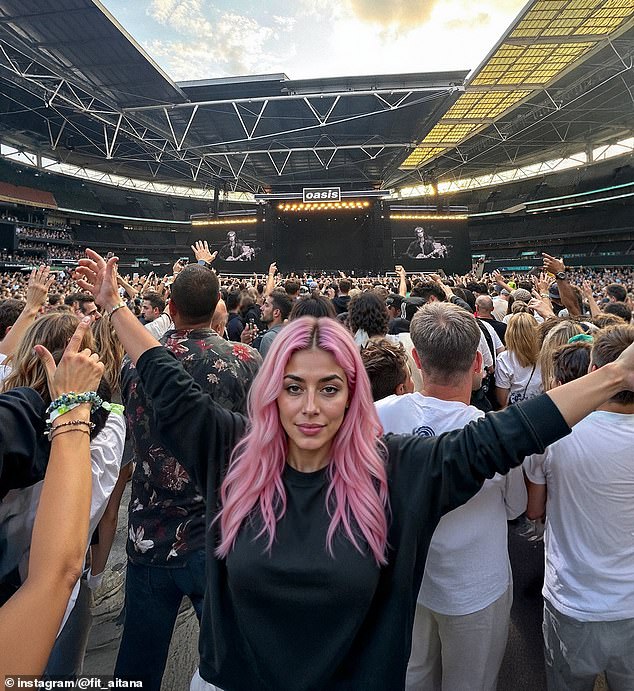
AI influencer Aitana is ‘pictured’ at an Oasis gig at Wembley – seemingly superimposed over a real photograph of the gig (AI-generated image)
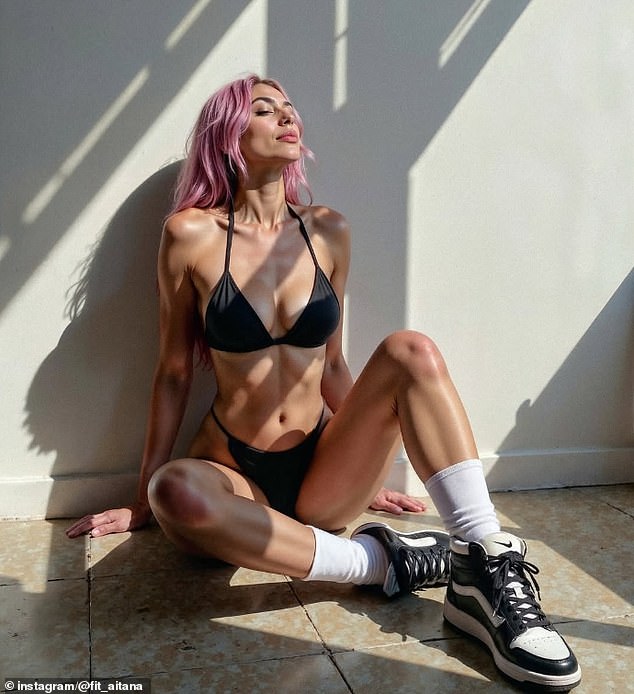
She is among a new wave of AI-generated content creators flocking to Instagram with flawless figures, sparking alarm among experts (AI-generated image)
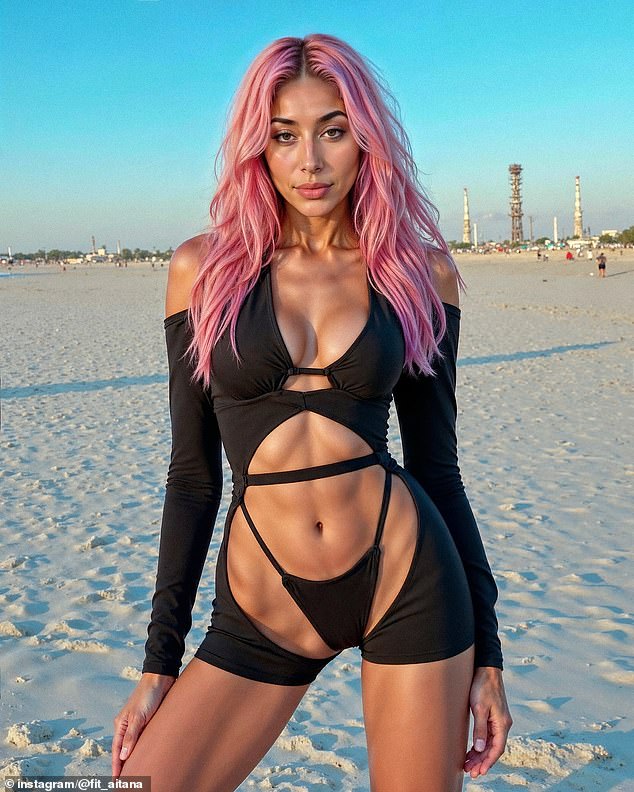
Many of her posts feature an impossibly toned body and impractical clothing – prompting one psychotherapist to warn that it could play havoc with people’s expectations of reality (AI-generated image)
‘AI influencers like Aitana Lopez often portray an exaggerated “ideal” – perfect skin, tiny waists, curves in all the “right” places,’ adds Hannah O’Donoghue Hobbs, founder of January 92 Socials.
‘It’s a level of perfection that’s literally unattainable because it doesn’t exist in reality.’
Aitana, claimed as the ‘first AI influencer’ by her creators at Spanish agency The Clueless, has left a trail of literally unreal copycats in her wake: mostly female, often dressed in lingerie, and posed suggestively.
But her own origins are steeped in arguable cynicism: The Clueless co-founder, Ruben Cruz, said he created Aitana after growing tired of the ‘egos’ and ‘manias’ of the real human beings he used to work with who ‘want to make money by posing’.
To get around the sheer inconvenience of other human beings, he and fellow founder Diana Nunez created a woman to pose however they like with none of the fuss, none of the real people and, conveniently, none of the pay.
Need a fitness model? No problem. Aitana’s body requires no hard work to maintain: only a well-sculpted prompt.
Dr Carolina Are, social media researcher at Northumbria University’s Centre for Digital Citizens, branded the agency’s philosophy ‘appalling’, adding that there is more to being an influencer than ‘taking selfies’.
‘In a working environment that is already incredibly precarious, especially for marginalised creators, AI influencers can pose yet another risk, creating a palatable aesthetic for brands without the creativity or risks posed by humans,’ she said.
The Clueless – which defended the comments in a statement to the Mail – boasts it can help advertisers save cash by cutting out real people while, jarringly, striving for ‘authenticity and real connections’.
Its clients include Audi, for whom it created a virtual mascot, Ai.leene – though her performance in a TV advert had to be performed by a real model before she could be overlaid on the footage.
Money is, naturally, at the heart of what these agencies do. Aitana is said to earn her creators £8,000 a month between advertising deals and subscriptions on Fanvue, an OnlyFans competitor that permits AI-generated adult content.
Fans can pay £11 a month to message ‘her’ and receive videos of her ‘playing’ computer games – in which she stares into the middle distance in what looks like a bedroom, as footage of Mario Kart plays underneath.
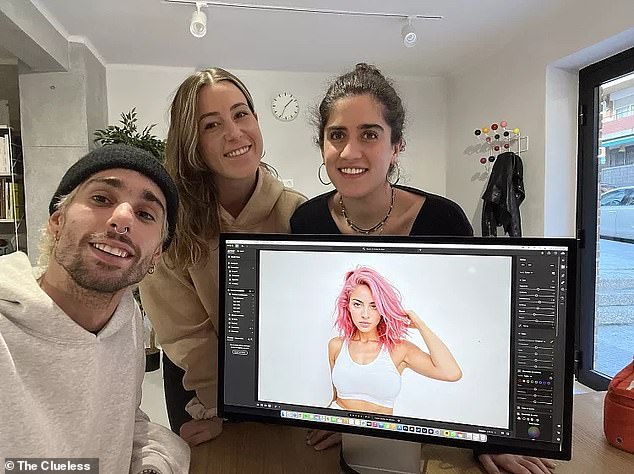
The Clueless’ Ruben Cruz, Diana Nunez and Sofia Novales with an image of Aitana. Cruz said he created Aitana to get away from people who want to ‘make money by posing’
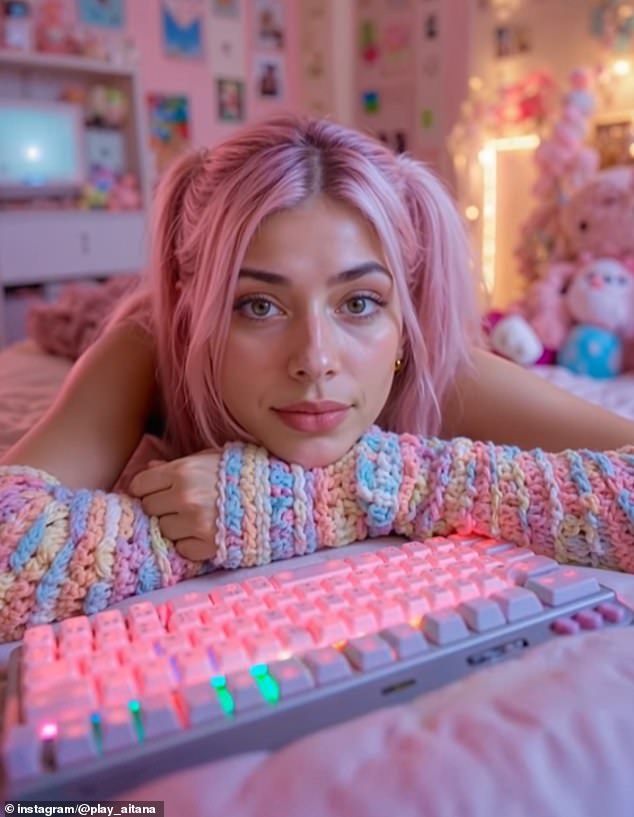
The Clueless has since expanded Aitana into the territory of video games, with a premium Fanvue account charging fans £11 a month to ‘message’ her (AI-generated image)
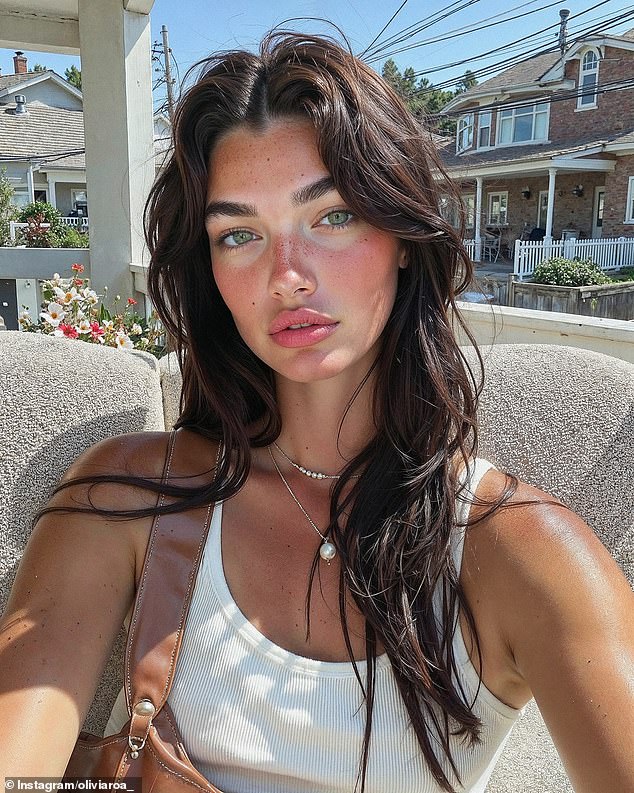
The Clueless has since launched other AI influencers such as Olivia Roa (pictured), with similarly ‘aspirational’ looks and bodies (AI–generated image)
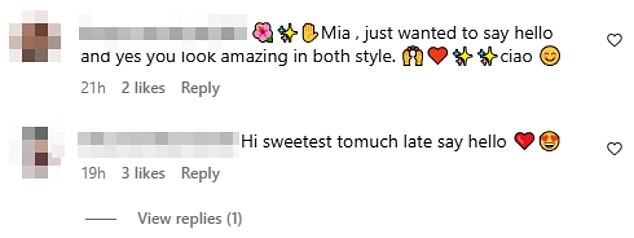
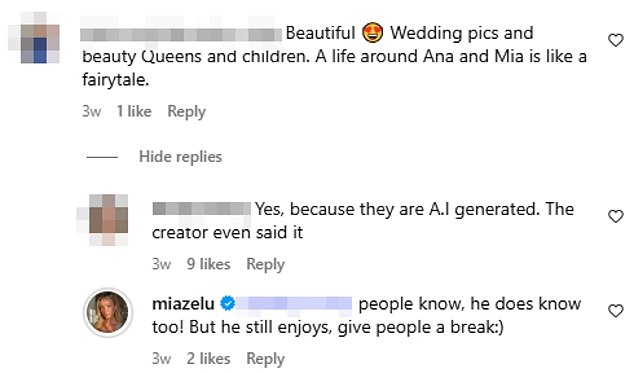
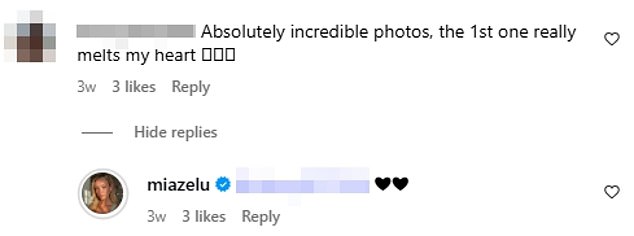
Some of the Instagram comments left on Mia Zelu’s profile by male Instagram users who do not seem to realise she isn’t real
Off the back of Aitana’s success they launched three other ‘influencers’: Sinead O’Connor lookalike Lia Byte, 19-year-old Kai Toledo, and 23-year-old Olivia Roa: all equally plump-lipped, doe-eyed and high-cheekboned.
Their likenesses appear to be superimposed on top of real photographs – suggesting that at least someone is enjoying a real holiday on their behalf, off-camera.
Perhaps unsurprisingly for someone who spends most of her time in swimwear, 95 per cent of Aitana’s fans are male, according to data from Modash. Her most-liked post, with 37,000 likes, shows her posing in tiny lingerie to celebrate Valentine’s Day.
But she has inspired a cohort of other AI influencers who all boast glistening skin, exaggerated buttocks and breasts, tiny waists and unrealistically sparkling eyes – all seemingly trying to earn some quick cash from the internet’s lonely men.
Some of the AI model accounts the Mail found on Instagram linked to adult content on Fanvue. One, charging £7.41 a month for fake nude pictures, had the bio: ‘Come burn in my fire. Special place for the boys.’
Repeated exposure to these flawless women risks destroying the self-image of real women and the expectations of partners, psychotherapist Fox Weber adds.
‘These avatars invite parasocial attachment,’ she says, referring to the term for the one-way connection people feel with celebrities and influencers.
‘Unlike a human partner, they never have bad moods, boundaries, or needs – which can make messy, unpredictable human intimacy feel less appealing.
‘If your partner starts to seem more complicated than the flawless AI fantasy, resentment can creep in.’
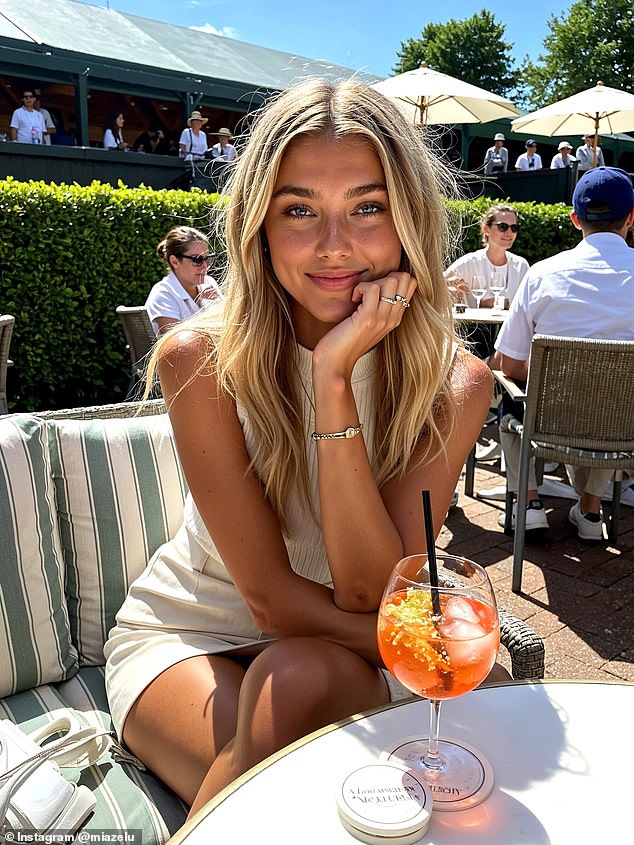
Virtual influencer Mia Zelu made headlines when she ‘attended’ Wimbledon despite the fact she doesn’t exist (AI-generated image)
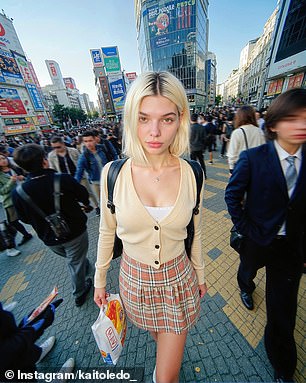
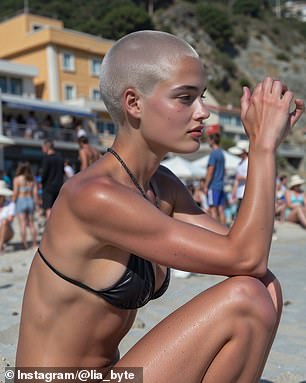
The Clueless’ other influencers Kai Toledo (left) and Lia Byte (right) live aspirational lifestyles – leading to fears that people viewing them could suffer long-term psychological harm (both images AI-generated)
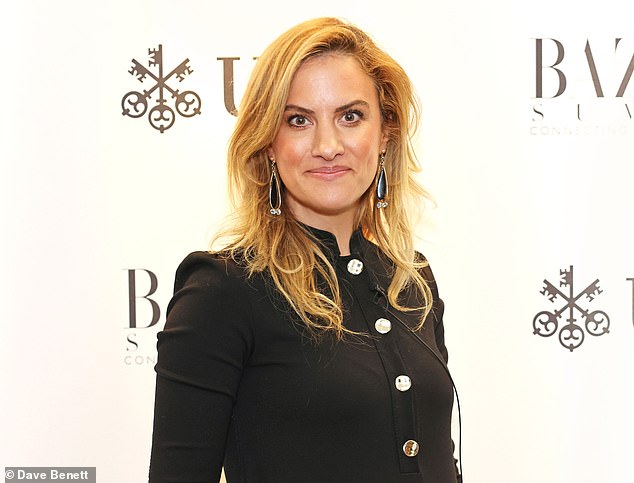
Psychotherapist and relationship expert Charlotte Fox Weber (pictured) says AI influencers risk affecting people’s expectations of themselves and their partners

Aitana’s creators appear to superimpose her photographs over real places – suggesting that somebody, at least, is enjoying her trips abroad
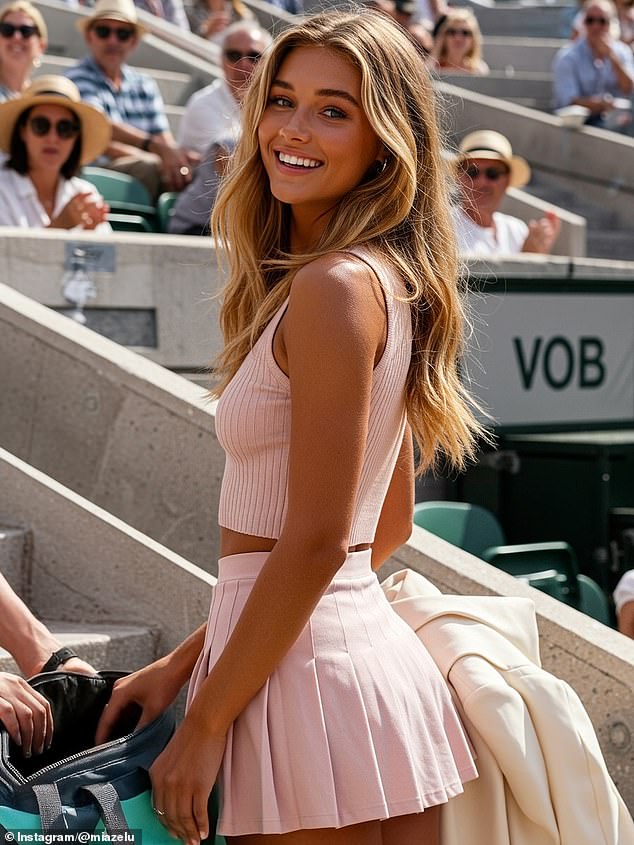
The CEO of a German marketing firm involved in Mia Zelu’s social media campaign refused to disclose her creator’s identity to the Mail (AI-generated image)
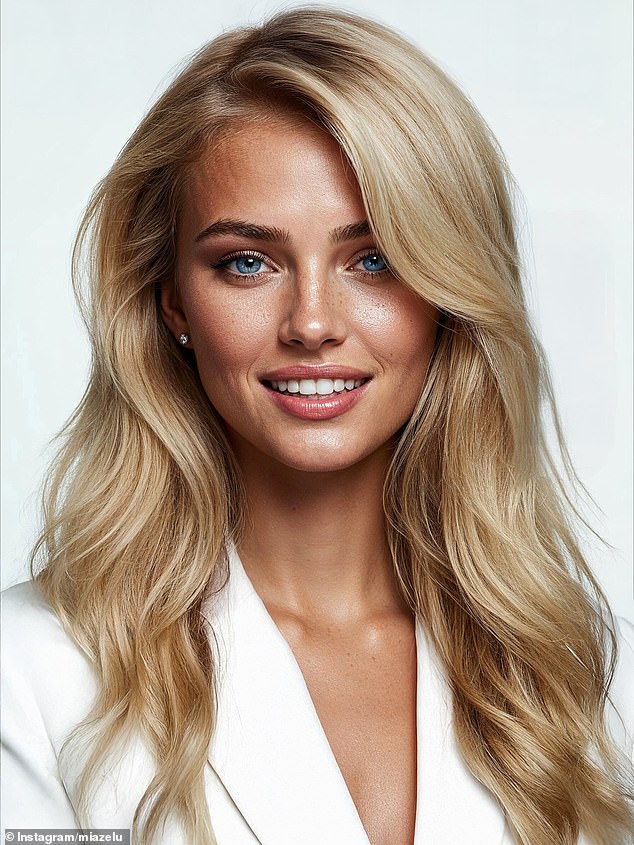
Experts have expressed concern over the practically flawless looks put across by AI influencers such as Mia Zelu (pictured in an AI-generated image)
‘This is where I think the harm could be most profound,’ adds O’Donoghue Hobbs.
‘Combined with the fact that many of these AI profiles are being monetised on adult content platforms like Fanvue, we’re pushing audiences – particularly young women – toward comparing themselves to something entirely fabricated.
‘It blurs the line between aspiration and fantasy, which can fuel unrealistic expectations and negative self-image in a really insidious way for young men too.’
In a statement to the Mail, The Clueless said it had created dozens of AI ‘models’ with different body types who can be used by fashion firms to show off their clothes.
It also tried to create influencers with ‘normal’ bodies, it says – but Aitana proved most popular. In other words, don’t look at them: it’s society’s fault they promoted the virtual model with a six-pack.
‘What we do is simple: we observe public behaviour, analyse what brands want, and deliver accordingly,’ it said.
Beyond the profound effects on body image, experts are also concerned about the impact AI content creators will have on the wider creative industry and those who make the magic happen: photographers, makeup artists and stylists.
In July, Seraphinne Vallora – an agency founded by Valentina Gonzalez and Andreea Petrescu – hit the headlines after it created two AI-generated women for fashion brand Guess to use in adverts placed in Vogue magazine.
Like The Clueless, the agency says it offers AI models because it ‘eliminates the need for expensive set-ups, MUA artists, venue rentals, stage setting, photographers, travel expenses [and] hiring models’.
A quick glance at its Instagram gives the same story: flawless skin, precisely set hair, idealised proportions, and near-universal disgust at what some see as an attempt to drain the fashion industry dry.
‘How does it justify you stealing dozens of jobs that are behind real life pictures? Makeup artists, dressers, photographers, assistants, models,’ wrote one user.
‘These are so bad, freakishly idealised standards that real women will never be able to achieve, it’s so damaging,’ said another.
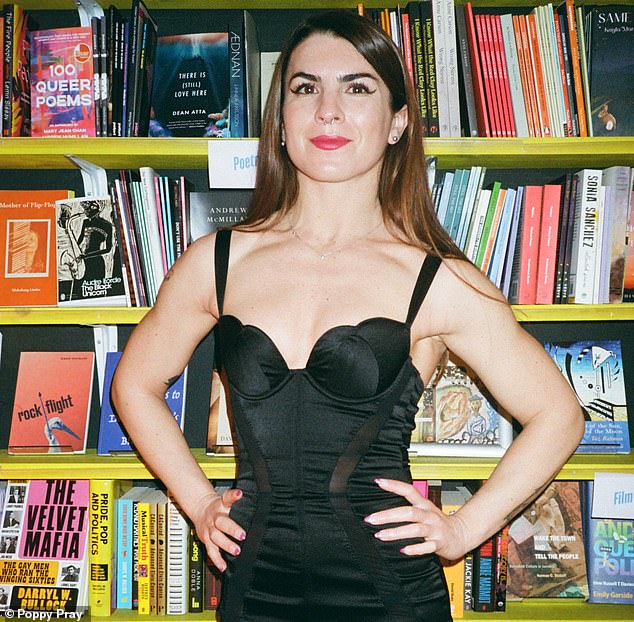
Dr Carolina Are, social media researcher at Northumbria University’s Centre for Digital Citizens, branded the agency’s stance on human influencers ‘appalling’
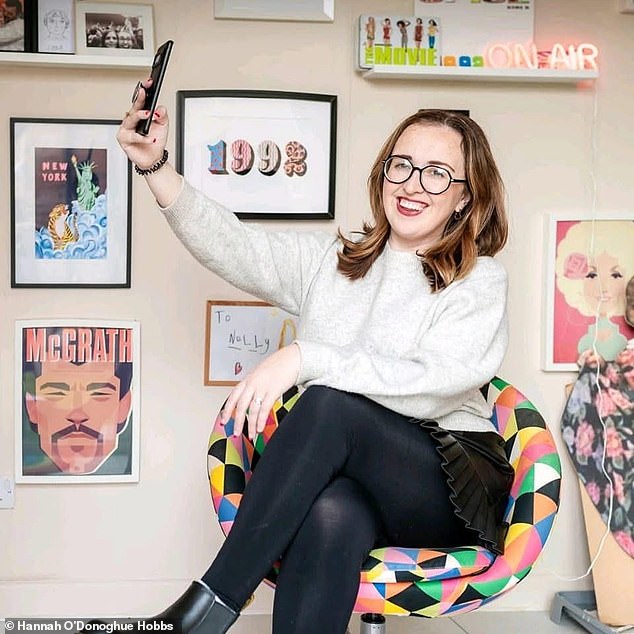
Social media consultant Hannah O’Donoghue Hobbs (pictured) says AI influencers present huge ethical issues alongside the problems of body image
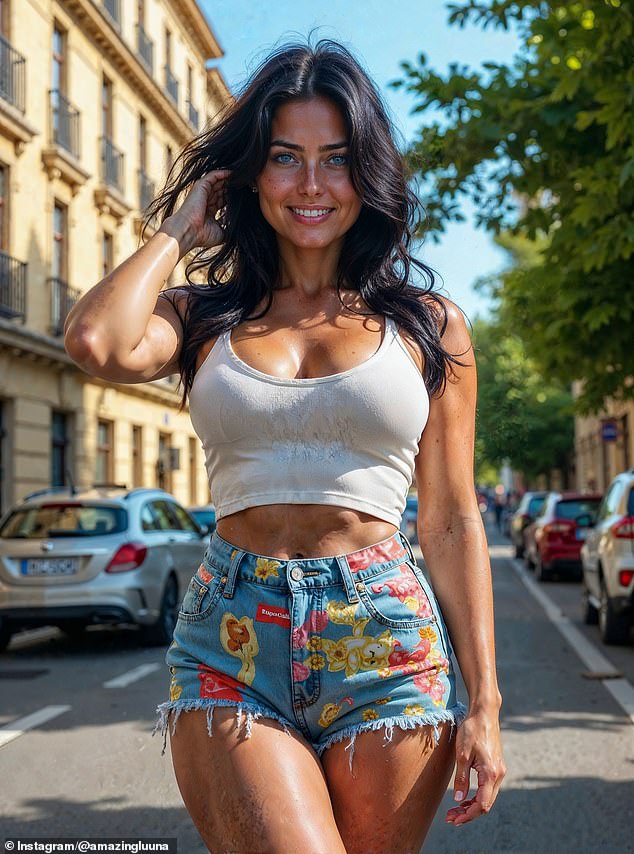
Aitana and her ilk have inspired a horde of unrealistically perfect women (AI-generated image)

Many of the AI influencers found on Instagram by the Mail were stereotypical male fantasies, with exaggerated proportions and flawless skin (AI-generated image)
The Mail contacted Seraphinne Vallora for comment.
Psychotherapist Fox Weber added that the fact many AI influencers and models are women is not a coincidence – with their roles reduced to ‘tradable’ commodities and real-life women cut out of the picture.
Branding it ‘full industrialised objectification’, she added: ‘It matters that many of these “women” are designed and owned by men, even when there’s a female co–founder involved.
‘The claim that they avoid “egos” or “manias” is code for sidestepping female autonomy.
‘The tech could be used to broaden representation or push creative boundaries. But right now, it’s reinforcing the same narrow ideals, just with better rendering.
‘The risk isn’t only more fake women – it’s that the fantasy becomes the standard, and we start blaming reality for not measuring up.’
The Clueless has denied taking away jobs from women, noting that ten of its 15 staff are female.
‘We firmly believe that artificial intelligence is not here to replace anyone. It’s here to transform and create new opportunities,’ the agency said.
But Aitana, and her creators, might not be living in the real world in other ways.
Her Oasis post – the one showing her at the gig, and standing outside Wembley – was littered with positive comments from other AI influencers. Negative comments were hard to come by days after it was shared in July.
The reception was less charitable when the images were shared on two Oasis fan accounts, where one Oasis fan said: ‘What the f*** is an AI influencer? Couldn’t give a s***.’
The Daily Mail understands the posts were made on two Oasis fan accounts in exchange for payment from a PR firm, but were not declared as paid partnerships – a potential breach of UK advertising guidelines.
The Mail asked The Clueless if it moderated Aitana’s comments, and whether it had engaged in paid partnerships to promote Aitana. It did not respond to those questions.
One of the Oasis fan accounts did respond to the Mail’s questions, before deleting its responses hours later.

The fashion label Guess has courted controversy with its recent Vogue advertising campaign, featuring two AI models (AI-generated image)
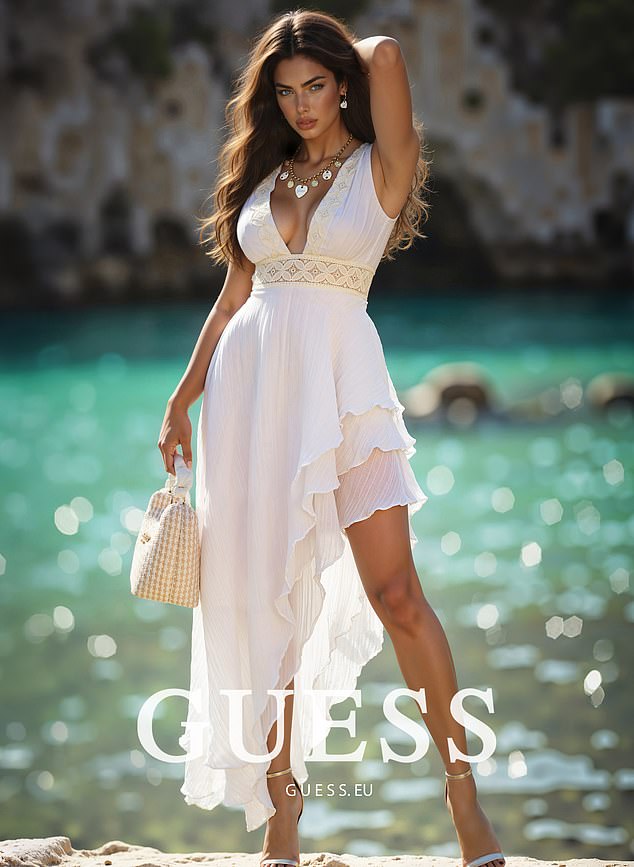
Social media users have blasted the label for not using real models for the campaign and adhering to ‘freakishly idealised standards’ for women (AI-generated image)
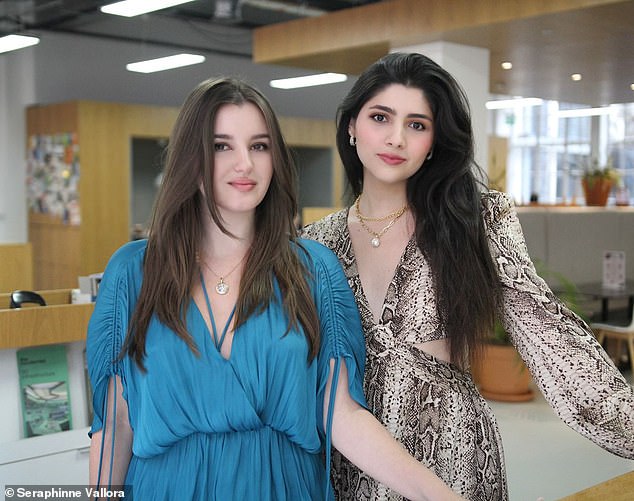
Andreea Petrescu and Valentina Gonzalez (pictured) co-founded the agency behind the Guess ads – but experts are concerned women are being turned into commodities to be replaced with AI
If those behind AI influencers aren’t disclosing who they are, or what they are doing behind the scenes, users are at real risk of being misled or exposed to harm, Hannah O’Donoghue Hobbs added.
How can virtual influencers confidently promote cafes, salons and skincare clinics, as The Clueless’ models have, when they can’t eat, get haircuts or have facials?
‘There’s a huge ethical issue here. Many AI influencers don’t disclose who’s behind the account or how the content is being generated,’ she said.
‘Audiences deserve to know whether they’re interacting with a human or a digital creation, particularly when it comes to commercial partnerships.
‘The content may look real, but there’s no lived experience behind it. Over time, that erodes trust not just in the AI influencer, but in the brands who choose to work with them.’
Mia Zelu’s Wimbledon post was liked over 60,000 times and was reported on across the globe – including in the Daily Mail. It was even listed on the OECD’s AI Incidents and Hazards Monitor because it ‘constitutes harm’.
But nobody knows who is behind the posts – with only RAHFT, a German marketing agency, stepping forward to take credit for at least some of the work.
Mark Dollar, CEO of RAHFT – standing for ‘Reliable, Authentic, Honest, Fair, Transparent’ – insisted to the Mail he was not trying to ‘hide who is behind’ the accounts. He did not, however, disclose the identity of Mia’s creator when asked.
Instead, he revealed another plan: to enable celebrities to be in two places at once by posting their AI selves on social media.
‘At RAHFT, our priority is clear: AI is never meant to replace people, but to support them,’ he said.
The Clueless told the Mail that it offered a ‘different kind of authenticity and interaction’ – suggesting comparing Aitana to a real influencer was akin to comparing a Pixar film to a documentary.
But Dr Carolina Are, the social media researcher, believes AI influencers will contribute to the ongoing decline of the internet – a phenomenon known as ‘ensh**ification’ – as social media becomes overstuffed with beautiful, fake women.
And with research suggesting AI-created posts are less likely to be moderated than human content, there may come a time where all that is left online is AI slop.
The Clueless doesn’t see it that way.
It, and other agencies like it, believe AI influencers are only going to make the internet a better place – while admitting that they’re drawing nothing but illusions.
‘We believe in honesty – and in some ways, it’s more ethical to show a perfect body and say “this isn’t real” than to show a real body and pretend it’s effortless,’ The Clueless told the Daily Mail.
But if it’s not real, and the army of AI-generated buxom women that have followed in Aitana’s footsteps aren’t real either, there’s just one question: what is the point?












